To our existing subscribers, welcome to this new platform! We’ll continue to use this list to keep you informed about Perspectiva events and our broader work. Over the coming weeks and months, we will also be posting shorter essays, book reviews, and reflections from staff, Associates, and community, as well as interviews and other multimedia features. Over time we aim for our Substack to serve as a lively space in which to think, feel, and learn together; posts will be worthy of your time and attention (and never content for the sake of content).
We’re celebrating our launch here with a foundational piece: ‘Perspectiva in Ten Premises,’ written by Co-Founder and CEO Jonathan Rowson.
For those new to Perspectiva, it provides a succinct, expressive guide through the fundamental ideas that guide our work. Those already familiar with us can dig deeper into the constellation of influences that Jonathan presents as part of each premise. At its core, ‘Ten Premises’ urges a collective and personal re-imagining of how the world is changing, and how to relate to this change.
Rather than a fixed manifesto, the piece acknowledges its own future evolution, and provokes further questions. As I read it, I wondered:
How might my generation of 35-45 year-olds respond to the inherent instability of this moment, and challenge what we have inherited, as we emerge into positions of greater influence? (Premise 1)
What would a new ‘aesthetic for second-order change’ look and feel like and what artists are already responding to this challenge? (Premise 4)
What are the various forms of education that are needed right now to encourage a more balanced approach to finding one’s ‘calling’, across all ages? How are communities, especially outside anglophone contexts, balancing ‘the collective and the deeply personal’ in unexpected ways? (Premise 9)
We invite you to engage with these premises from your own personal perspectives, challenge them if you feel called to, and respond with further questions of your own in the comments section below.
A note on paid Substack subscriptions: We call ourselves ‘an urgent hundred year project’ because we are committed to responding to the time-sensitive need to change direction; we believe that the changes required are deep, and we are in it for the long haul. Our work has already been supported by a range of trusts and foundations, including The Fetzer Institute, the JJ Trust and The John Templeton Foundation. To build and maintain a team worthy of this exacting work, we also seek public generosity: if our sense of purpose appeals to you, please consider supporting our work financially by signing up for paid monthly, yearly, or founding membership of this Substack. In the coming months we will introduce special paid-subscriber-only posts and features. As a free subscriber, you will continue to receive most of our posts, including our newsletters advertising events, organisational news, and publications.
Again, welcome!
Leigh Biddlecome, Visiting Editor and Curator, Perspectiva
Perspectiva in 10 premises
by Jonathan Rowson
We are in a time between worlds:
The philosopher Alasdair MacIntyre once wrote: ‘I can only answer the question “What am I to do?” if I can answer the prior question “Of what story or stories do I find myself a part?”’ We believe the ‘what am I to do?’ question arises in the context of a true story of being in a time between worlds – an empirical claim, not just poetry. This is a time characterised by a shift in geological time from the relatively stable Holocene to the unstable and potentially devastating Anthropocene (Capitalocene) and more generally by the spiritual and material exhaustion of modernity, in which there is profound uncertainty about what is emerging, and how we might best relate to it. We are called to allow some aspects of the world to die well, while protecting and supporting the tender vitality that is nascent and ubiquitous.
Collapse is inevitable and transformation is possible:
The world of the Bretton Woods settlement, the UN Declaration of Human Rights, nation-states, the rule of law, and the so-called free market appears to be unable to adapt – at a fundamental level of design, values, coordination, and mandate – to the new internet-mediated information system it has created, the ecological strain it has generated, and the concentration of financial power it has allowed. While there are metrics showing progress of various kinds, including mitigating the climate crisis, the sense of gradual collapse is felt keenly by those who see the world as a complex system with multiple interrelated elements and non-linear dynamics.
In Daniel Schmachtenberger’s language, the world system can be viewed as ‘self-terminating’ due to what he calls its underlying generator functions, namely the escalation of rivalrous dynamics (competition within and between elites) co-arising with ‘exponential technology’ (technology that creates more technology at an accelerating rate) and the consumption of our own ecological substrate. From that perspective, unless we change those generator functions – and they are not easy to change – the world we have known will almost certainly end. This end might happen slowly, but in a way that is likely to quicken due to the emergent properties in play. Some degree and some kind of collapse in some places is already underway, a larger scale civilisational collapse is a distinct possibility in the near to medium term, and paradigmatic transformation over the next few decades seems inevitable. There are visionaries who suggest the evolution of consciousness is unfolding as it should be and is giving rise to something beautiful, but to the dispassionate mind the main ‘attractors’ (in the complexity theory sense, rather than the attractiveness sense) at present are a gradual decline to civilisational collapse, or an increase in authoritarian control. We do not know the extent of the shift that is underway, but it appears to be at least as seismic as the axial revolution. Those who perceive and understand this have a responsibility to live and work accordingly.
We can and must act in three different kinds of reality:
We don’t have a choice to change ourselves before we change the world or vice-versa – the relationship is reciprocal and it is always all happening at once. Rather than just lament ‘the state of the world’ as an undifferentiated whole, we may need a newfound understanding of the different forms of reality in play.
In many philosophical accounts of reality, from Karl Popper (World I, World II, World III) to Jurgen Habermas (technical, hermeneutic and emancipatory knowledge interests) to Felix Guattari (environment, mind, society) to Margaret Archer (structure, agency, culture) to Marvin Harris (infrastructure, superstructure, social structure), it is argued that while there is ultimately one world, it is characterised by a kind of threeness. In essence, there is an external objective reality, an internal subjective reality and a shared reality with objective and subjective elements. Each of these ‘three worlds’ have distinctive ontologies, by which I mean they are made of different kinds of stuff; they will have distinctive epistemologies, by which I mean they will be known in different ways; and they have distinctive axiologies, by which I mean they will be valued differently and for different reasons.
Our challenge is to understand the co-arising of the systems and structures of the external world, the deep interior of our inner worlds, and the challenge of making sense and meaning in our shared worlds, while also attending to how they influence each other. That’s why Perspectiva is interested in understanding the relationship between what we call “systems, souls, and society” in theory and practice. Without understanding how these different features of the world relate to each other better, we have neither a map nor a compass worthy of the terrain.
A post-conventional sensibility is arising:
In Margaret Mead’s understanding of cultural transmission between generations, it appears that we may also be living in a pre-figurative culture, where the past is not the guide to the future, and many are living without a coherent sense having a world to grow into. The challenge today is not just to download the societal code, individuate from it enough to feel sane and successful, and trust the world to behave itself. The world now is not just becoming unstable but is clearly increasingly unstable. At the risk of generalising, people born and raised in capitalist democracies after about 1990 have been brought up as digital natives in an ecologically compromised world with economies that are not serving the common good, where exponential technological change is capable of radically altering society at the whims of a billionaire class, and gerontocratic leaders keep getting elected by telling implausible stories. It is in that kind of world, which is figuratively and often literally on fire, that the young have to conceive a future for themselves — even though the society they are supposed to adapt to appears delusional and necrotic. This is what Perspectiva Associate Bonnitta Roy means when she says the young today have to “individuate themselves from the whole world.”
More generally, the prospect of a transformation happening within and through open societies will require artistic vision, which probably means something like Ben Okri’s ‘existential creativity’: an aesthetic orientation infused with the real possibility of the world ending. One way to characterise the need for existential creativity is to get beyond what Hanzi Freinacht calls ‘game denial’ of thinking we can just ‘press the nice guy button’ and everyone will behave well, but also beyond ‘game acceptance’ that says things are more or less ok, and all will be well. What is called for is ‘game change’ – a shift in the underlying rules and purpose of what life is for. This is sometimes called second-order change (Watzlawick), which is about changing the way things change, and that is most likely to arise from a new aesthetic. The sensibility in question is porous and still arising, and is sometimes described as metamodern, but the post-conventional aesthetic appears to include the following orientations towards the past, present and future:
Post-tragic (knowing life as tragic and beautiful, meaningful, purposeful)
Post-rational (respect for intuitive, mythic and mystical ways of knowing)
Post-extrinsic (societal purpose reconceived towards intrinsic value)
Post-exploitation (historically aware, and vigilant about abuses of power)
Post-tribal (seeking unity in diversity of all kinds, but not naively)
We need to get out of our own way:
So there really is a path, and a sensibility to help us get there, but any viable strategy to move in that direction depends on an awareness of competing commitments and countervailing developments. This means we need to contend not only with resistance and conflict, but with the kinds of immunities to change that matter most, and which are endemic in the existing world. The heart of the matter is not our immunity to mere ‘change’; the hold the social imaginary has on us means we have immunity to collective spiritual transformation, and a deep (understandable) resistance to allowing ourselves to become different kinds of humans, or perhaps just more fully human. Even in the context of ‘the pickle’ (our ecological emergency, crisis of governance and various meta-crises) a renaissance of perception, purpose and praxis is required to build a viable and desirable world. Perspectiva is about this ‘urgent 100-year project.’
The method is education, but not as we know it:
We believe ‘the work’ is to build a new ecosystem of transformative civic, aesthetic and moral learning (‘education’ in its proper sense, but also Paideia and Bildung) that speaks to the curriculum of our times, namely how we collectively master the challenges of:
Meaning (What really matters in life and can we coalesce around that?)
Intelligibility (What’s going on and how do we know?)
Capability (Do we have what it takes to do what we need to do?)
Legitimacy (Who gets to decide how society transforms; on what basis?)
Imagination (What does a path to a desirable world look and feel like?)
These challenges are a distillation of the minimal principles of inter-generational transmission and social autopoiesis – the process by which society reconfigures and reconstitutes itself. This matters more than ever in a pre-figurative culture in which different generations do not always inhabit the same world, and younger generations may in some sense perceive what is happening more clearly (consider Greta Thunberg lambasting global leaders at the UN). When we speak of ‘education’ it is this challenge of maintaining a viable culture across time that is at stake, and there is much more to that today than just trusting the elders.
This distinctive educational context is also why Perspectiva is keen to create and support expert generalists: The idea of an expert generalist is paradoxical but not oxymoronic. In theory, our very best philosophers, civil servants, political leaders, and writers are expert generalists – their defining skill is inclusive synthesis and their defining qualities are epistemic acumen and agility: know-how with knowledge, having enough expertise in one domain to value different forms of understanding, and knowing how to integrate them while retaining curiosity towards whatever which remains unfamiliar.
Civilisational renewal may depend on a new metaphysics:
The roots of this kind of challenge of making sense of what drives history and social change go back a long way. For instance, Marx and Engels argued that the economic base and cultural superstructure both drove history, but it was the economic base that was the most fundamental basis of social change. More recently, thinkers like Iain McGilchrist tacitly argue the other side, namely that social change depends primarily on patterns of attention, perception and understanding. As indicated, there is no doubt that ‘systems, souls and society’ are all in play, nor that we live in an age of fierce and accelerating technological change. However, because we are in a time between worlds, there is a case for rethinking the world at its most fundamental level. Zak Stein puts it like this:
“During times between worlds there emerge certain ideas and thinkers that are, properly speaking, without a world. Their work is about creating a new world, by necessity…The focus of work in the liminal is on foundations, metaphysics, religion, and the deeper codes and sources of culture—education in its broadest sense…”
Bonnitta Roy helps indicate what follows: "We are not so much working for greater systemic reach or to identify all the links in an enormous causal chain; rather we need to closely examine the metaphysical operating system of our minds, and participate in the creative emergence of a new structure of consciousness.”
What we need is not ‘action’ but power to create context:
As indicated above, what matters most today is not merely being able to change the world but to change how it changes. If agency is the capacity to make choices within conventional social processes, hyper-agency is the capacity to be a creator or producer of those processes. Philanthropists have this power in theory, but don’t always use it well. At its most successful, around April 2019, Extinction Rebellion showed signs of hyper-agency. To change systems the emphasis is on the creation and better mobilisation of hyper-agency, which is about the capacity to shape circumstances and contexts rather than merely acting within them. For instance, agency can improve an underperforming school, but hyperagency can create a new school system with a new curriculum.
“The social capacity to create rather than simply work within the institutionally given world...the capacity to exercise what we call hyperagency – the ability to exercise effective control over the conditions and circumstances of life rather than merely living within them.” – Paul G. Schervish and Andrew Herman, 1988.
The challenge is to somehow democratise hyperagency, so that is not merely something available to Tech Billionaires and heads of large states. Democratising hyperagency is not the same as merely trusting the state, but about resisting whatever is given as being the default form of life, and that includes forms of technology but also the language we use. This process amounts to a kind of field creation, growing coordination within a larger domain of inquiry and practice among those who share the post-conventional sensibility, for instance with a collective funding process, targeting philanthropists and impact investors who have the power to begin addressing the meta-crisis and supporting it institutionally and culturally.
Our praxis has to be profoundly collective and deeply personal:
It is thrilling to think that our overarching worldview can and possibly should shift, and that it might happen quite quickly, along lines similar to those mentioned by Jeffrey Kripal in The Flip. Such a change may also be more gradual, as theorised by, for instance, Iain McGilchrist in The Matter with Things. We are keen to explore a method of spiritual innovation called imaginal causality. This needs to be experienced rather than simply described, but it works with the experience of reality in the process of becoming (logos), our relationship to time (temporics), and the imagery that shapes us (imaginal) – this will feature in Perspectiva’s Realisation 101 course later in 2023. While this approach is relatively untested, we believe it may potentially give rise to greater collective individuation – that notion at the heart of Bildung (with elements from Carl Jung and Elinor Ostrom), namely that we find our calling, and figure out who we are and what we should do with our one precious life. Our conviction is that our predicament calls for planetary-scale praxis that is both profoundly collective and deeply personal.
Those who would be angels can still learn from the mafia:
This final premise is stated partly in jest but totally in earnest. I don’t literally mean we can be angels, nor that we should seek to be like the mafia. I simply mean that we need to improve our relationship to power. To transform society in deep ways we need to cooperate and compete more wisely, but ‘wisely’ here also means, to some extent, ‘shrewdly’, too. That means getting beyond heroic assumptions. We can do that without losing our integrity and love for our better natures. To capture the tension of this living question we call this ‘The Impossible We?'. There is abundant good will and ingenuity in the world, and we believe in giving our better natures every possible chance. Even so, the only pathways to a viable future for humanity that seem credible are those that acknowledge the enduring realities of self-interest, competition, conflict, defection and corruption. This point is acute in relation to ecological collapse in particular, where ‘we’ are called to act. The core problem is the absence of any locus of shared power to generate cultural sensibility and policy coordination commensurate with our collective action challenge, and to see it through in the context of widespread political divergence and resistance. None of this is easy!
These ten premises are best thought of as provocations. They are not axioms and they are likely to change, but they do help to inform Perspectiva’s current activities, which include book and essay publishing, an annual festival, innovation in social and spiritual practice, transformative education, and building a metamodern field of praxis. The ‘ten premises’ is only one way to state our sense of purpose, and these kinds of ideas will be further developed in Perspectiva community activity to follow in the coming weeks and months.
This post stems from a presentation given to The Institute for Global Governance at UCL on June 19th, 2023. Click below for a copy of these slides, which include references and additional context for Perspectiva’s work.








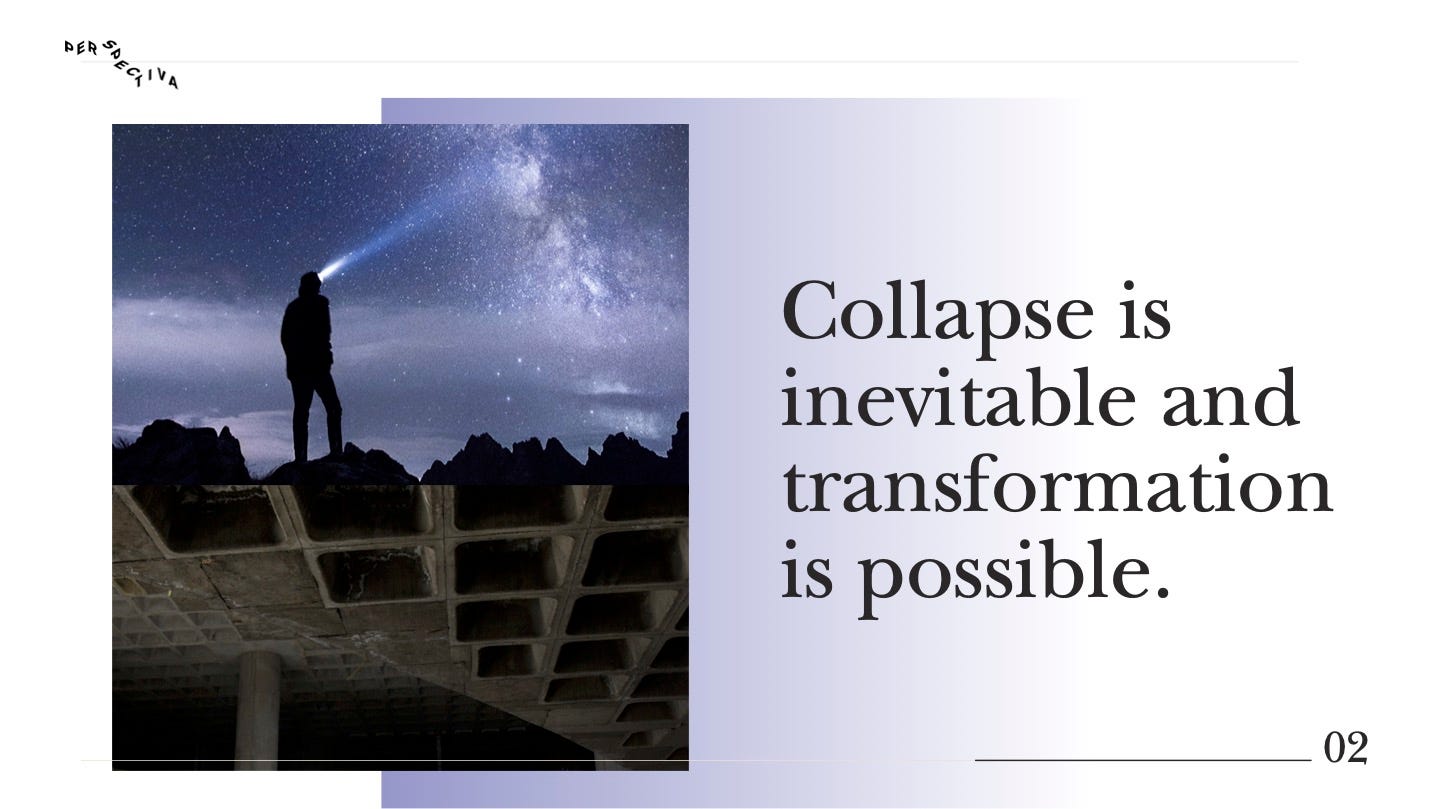
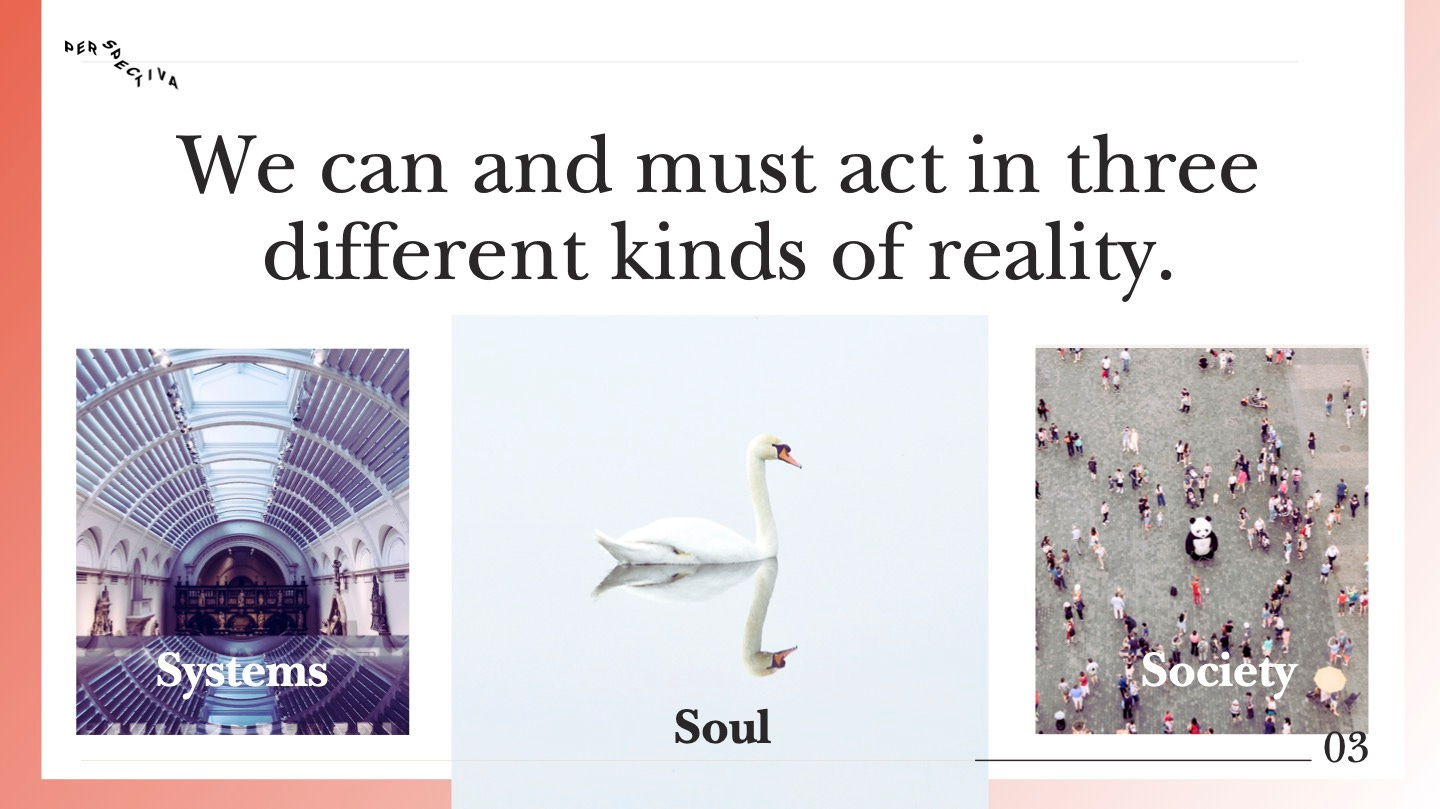
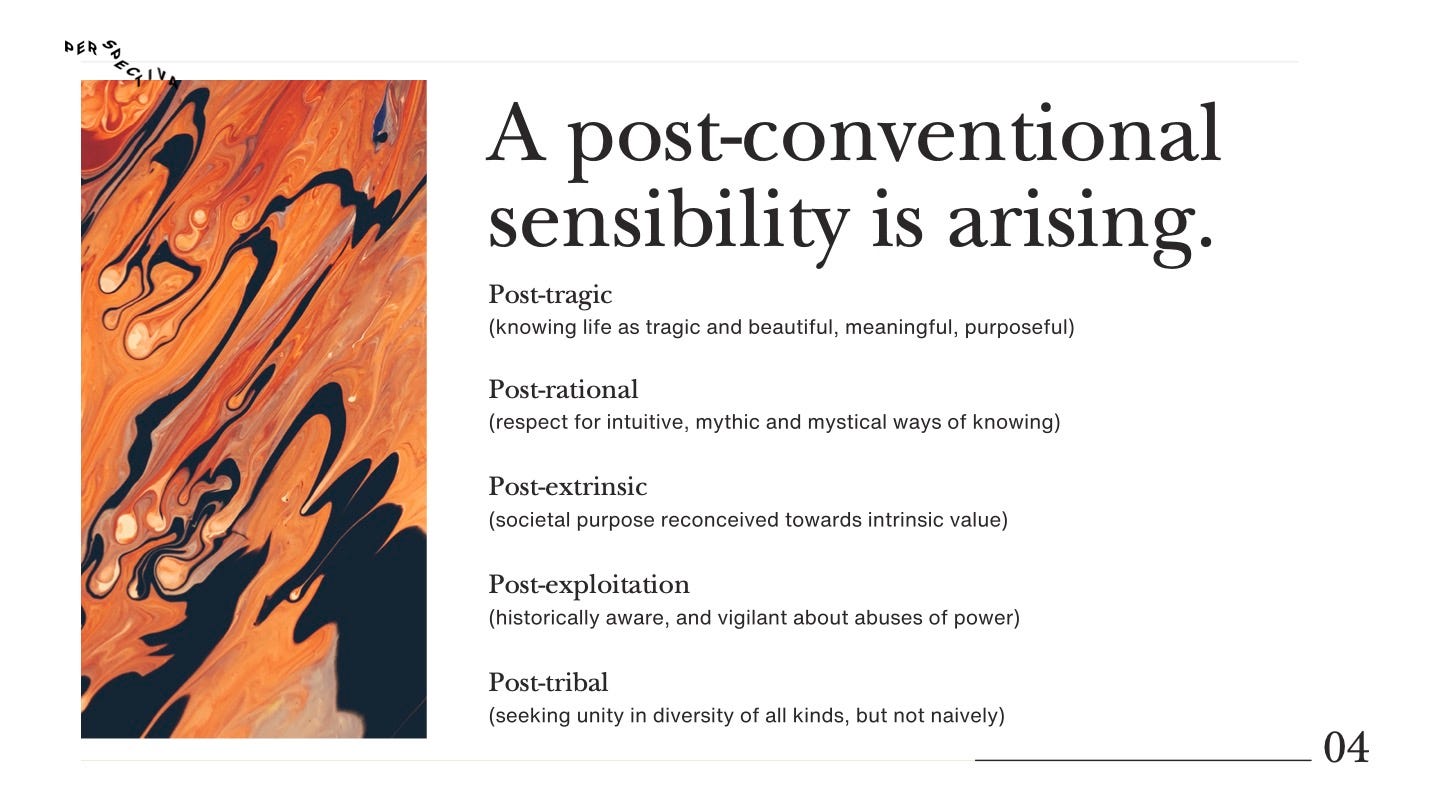
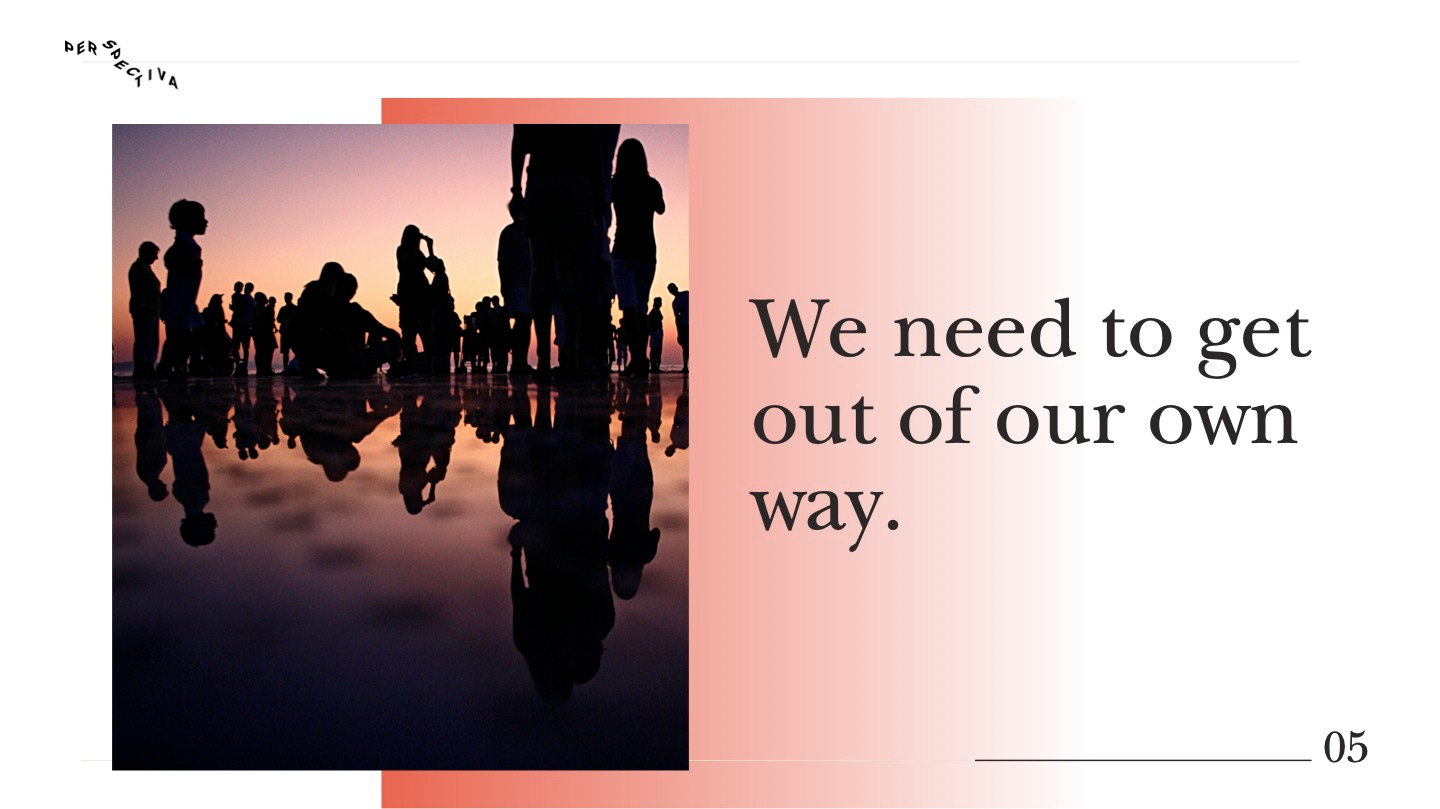
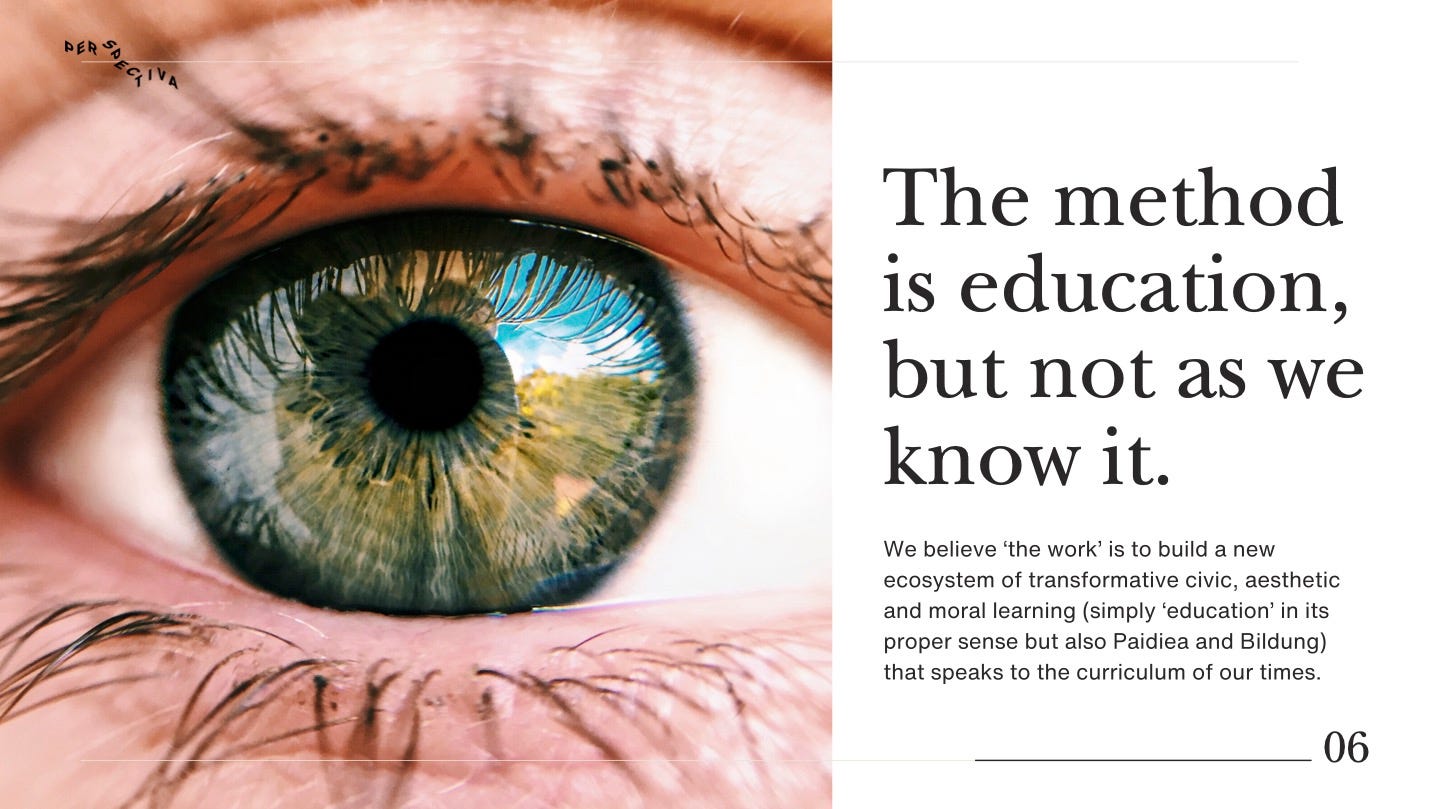




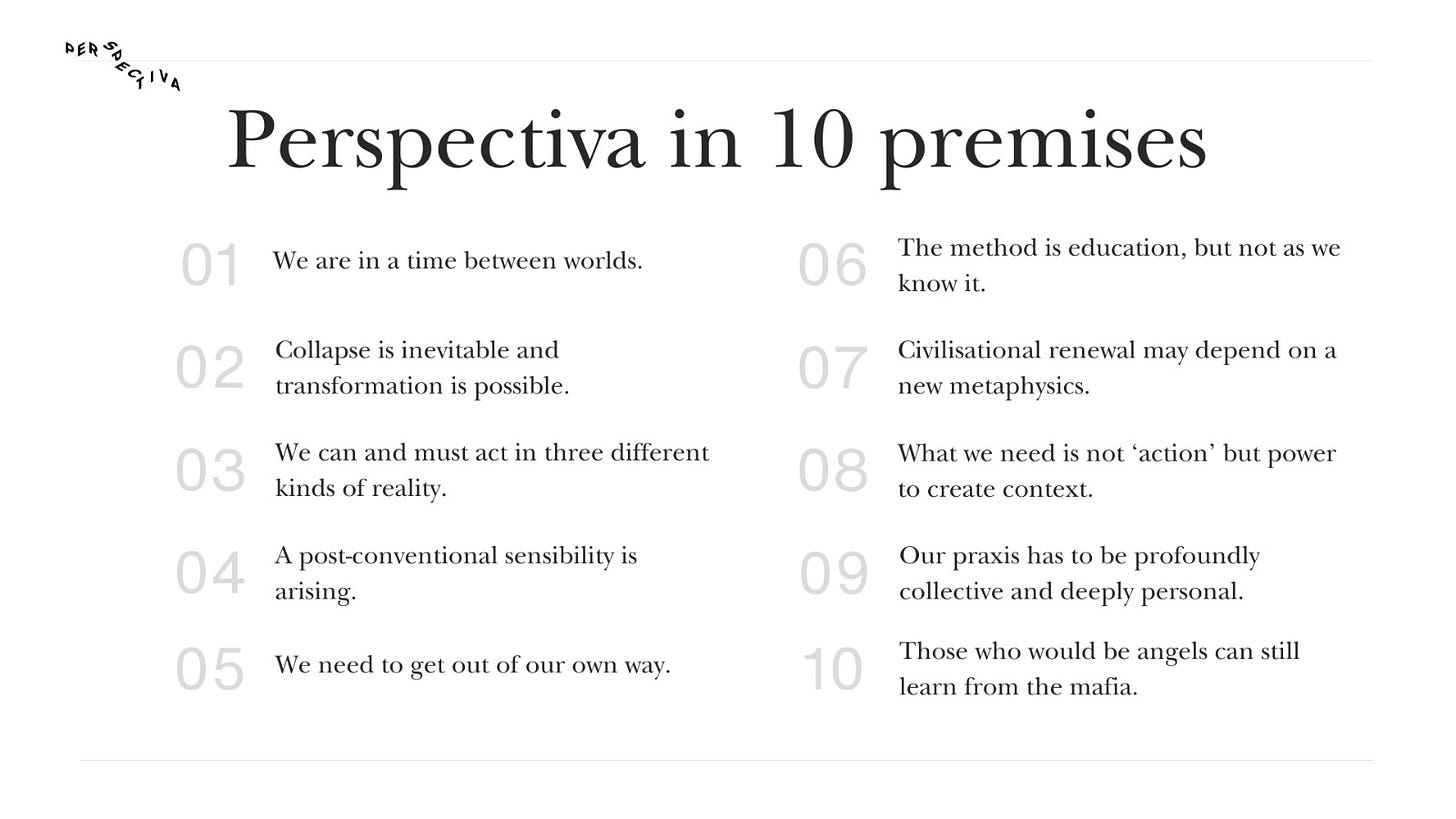

Continued.
7) One of the most important questions you ask is “Who gets to decide how society transforms? On what basis?” Well, it shouldn’t be the arrogant idealists who represent what Thomas Sowell called “The Anointed”, because they’re so sure they know what is best for everyone, and all we need to do is put them in charge. And of course we wouldn’t end up with another Soviet Union, would we? Nobody gets to “decide how society transforms” – nobody knows everybody else, or themselves, thoroughly enough. We all decide, collectively, through individual actions in our lives and democratic actions in our societies. Or you promote hell, even if you didn’t intend to. You promote the tyranny of the self-righteous.
8) “Younger generations may in some sense perceive what is happening more clearly (consider Greta Thunberg lambasting global leaders at the UN).” Come on, get real. I like Greta – she is sincere and was, and I hope is still, well-intentioned. But she was a teenage girl when that happened. Teenagers have raging hormones and an operatic level of emotion and idealism – it is an enormously significant time for religious conversion, falling in love, becoming some particular “identity”, and committing suicide. This is not “perceiving what is happening more clearly” – it is just powerful emotional commitment, in the absence of perspective and sufficient life experience. Greta told us over five years ago that we’d all be finished in five years’ time. People are now talking about the “urgency” of the “crisis” and how we have ten or twenty years to sort things out. Well, in thirty years’ time, if we haven’t been wiped out by Artificial Intelligence, I imagine Greta will still be here – and we’ll still have problems – and people with appropriate technical knowledge will be helping us to make more progress in sorting them out – and more teenagers will be telling us we’re doomed, possibly for some completely different reason.
9) So there is “more to that today than just trusting the elders”. What does that mean, that an intelligent and educated person should not listen to someone who is just as intelligent and probably even more educated and certainly more experienced, because none of that has any value? Let’s just throw them all away and let the woke and insufficiently informed take over, shall we? That would hardly be a wise suggestion, would it? (I agree that over-simplified sentence is contradicted by some of your following paragraph – but it still reeks of the idealistic youth rather than the sage.)
10) I agree that our metaphysics is on the verge of a hopefully significant change, supported by interpretations from cognitive neuroscience as well as philosophical approaches.
11) “Hyper-agency”. I understand this concept is pushed as (a) part of resentment about the way philanthropists operate, as if they should give the money to The Anointed who would know how to use it “better”, and (b) as part of the desire for “the transition to socialism”. No kidding. So now the radical left agenda comes more into the open. And “At its most successful, Extinction Rebellion showed signs of hyper-agency.” If you want to make the world better, you recognize that Extinction Rebellion are idealistic fools, and often old enough to know better. You don’t make the environment better by holding up traffic, including ambulances and fire engines and doctors on their way to emergency calls, or by gluing yourself to a road or a window. You get educated, you get qualified, in something relating to how human society obtains and uses energy, and then you work with your knowledge to make things better. If you think you make anything even a tiny bit better by wrecking the innocent enjoyment of a competition for snooker or dancing or horse-racing or whatever, then you need to find a more constructive way of spending your time, instead of just drawing attention to your narcissistic idealistic socially useless self. You take responsibility instead. That’s a lot harder.
12) Those who would be angels can learn from the mafia. Of course this is stated “partly in jest”, except that it isn’t, because it is “totally in earnest”. We need to “improve our relationship to power”. Well, write to your MP. Go into politics, whether locally or nationally. Exercise your vote. We have a relationship to power. But allegedly we need to “cooperate and compete more wisely,” which also means “more shrewdly”. Oh, yes, sure it does. How sneaky does that sound? Does it sound like just using freedom of speech and democratic processes? That means “getting beyond heroic assumptions.” Well, there’s a modernist statement for you. Being heroic means facing challenge and adversity, and overcoming it with ingenuity, courage, and strength (which does not have to mean physical strength). Any society that leaves that behind is lost, it might as well lie down and die. It just happens to sound to the woke like “toxic masculinity”, rather than totally admirable characteristics of any human being.
So your metaphysics are good; your hearts may often be in the right place, although you could have said that about a bunch of Bolsheviks in 1917, before the horrors of the Gulag and a society built on lies and mistrust. Your psychological and political perspectives, however, appear to have been, just like academia, thoroughly corrupted by post-modernist thought processes and politics – and that statement can NOT be made about Iain McGilchrist or John Vervaeke.
What if only the book was the person, and the person is not the book we met?
What if the gestalt was where the manual was washed in the waves, never to be read or quoted again?
What if the news was boring and noted the crowd running by.
What if life was a tree, only to share its water and fruits as if only to exist without any demands to wake it up and shake it back into production?
People need people, individuals need nobody, they are already a category and box.